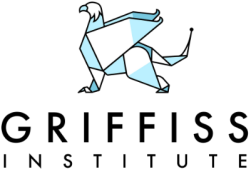ROME, NY — The Griffiss Institute and the Cyber Research Institute, together, present a Dine & Development Training Series Workshop: Understanding and Using Interactions of People in Real and Virtual Environments, on Thursday, October 25, 2018, 11:30 am – 1:00 pm, at Griffiss Institute, 725 Daedalian Drive, Rome, NY. The cost to attend is $15 and includes lunch. Interested parties are asked to register by Tuesday, October 23, at www.griffissinstitute.org/dineanddevelopment.
The Dine & Development Training Series is a collaborative effort, bringing together local businesses, Air Force Research Laboratory researchers, and academia to expose and inform the Central NY business and research community on technology-driven topics of common interest, and to also promote business development by providing networking opportunities among researchers and attendees.
Topic: Understanding and Using Interactions of People in Real and Virtual Environments
The Internet, social media, smart consumer devices, and sensors have enabled the generation of vast quantities of data on human behavior for analysis, research and use of this data in a large range of applications. In this talk, Dr. Banerjee will discuss his research in:
- the structure of language as used in bug reporting systems to determine whether problem reports describe original or pre-existing issues in software system
- using human perceptible differences in commute time to automatically cluster the United States Census data to provide improvements in computing drive times for site selection
- leveraging user familiarity with smart consumer devices to improve authentication of users
- using real-world user behavior in virtual environments to provide free form user authentication
Learn how a Clarkson University lab is reconstructing new forms of 3D multi-modal data by fusing input captured by a dense multi-view multi-modal sensor system and using this data to provide automation in fields such as physical therapy, occupational therapy, software engineering, and robotics.
Presented by: Dr. Sean Banerjee
Assistant Professor in the Department of Computer Science at Clarkson University
Co-Director of the Terascale All-sensing Research Studio (TARS)
Prior to coming to Clarkson, Dr. Banerjee was a post-doctoral researcher at Carnegie Mellon University in Pittsburgh, Pennsylvania, where he worked on building the first hardware synchronized multi-Kinect capture system. He received his Ph.D., M.S. and B.S. from West Virginia University in 2014, 2006 and 2004 respectively. He also holds a Graduate Certificate in Computer Forensics. His research lies at the intersection of software engineering, big data, natural language processing and human-machine interaction. He was co-author on the HASE 2011 Best Paper titled “Effects of User Habituation in Keystroke Dynamics on Password Security Policy” and the MMSP 2018 Top 5% Paper titled “User-Independent Detection of Swipe Pressure using a Thermal Camera for Natural Surface Interaction”.
RSVP by October 23 at www.griffissinstitute.org/dineanddevelopment.


